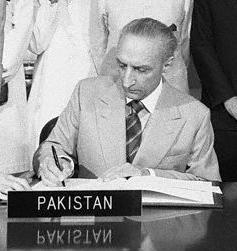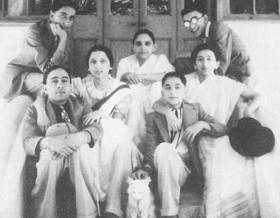 As many people guessed correctly, the person in our most recent ATP Quiz here was a young Sahabzada Yaqub Khan, former foreign minister of Pakistan.
As many people guessed correctly, the person in our most recent ATP Quiz here was a young Sahabzada Yaqub Khan, former foreign minister of Pakistan.
Yaqub Khan was a unique and multi-talented high-achiever – general, statesman, diplomat, intellectual. He was born in 1920 in the Royal Family of Nawabs of Rampur, India. He first joined the Indian Army and when Pakistan got independence, he migrated to Pakistan and continued to serve in Pakistan Army. While serving in Pakistan Army he rose to the rank of a Leutenant General and served in East Pakistan as the Chief of General Staff, Commander Eastern Command. For a brief period of 1 week he also became the Governor of East Pakistan.
After retiring from Army in 1972 Sahibzada Yaqub Khan served as the Ambassador of Pakistan in USA, USSR and France. From 1982 onwards he was designated as Pakistan’s Foreign Minister in different Governments. Between 1992-97 he also served as United Nations Secretary General’s Special Representative for the Western Sahara.
Sahabzada Yaqub Khan is also the founding chairman of Aga Khan University Board of Trustees. In June 2005 Aga Khan University Press published a book called Strategy, Diplomacy, Humanity on the life and work of Sahabzada Yaqub-Khan.
Above all, Shaibzada Yaqub Khan was a “personality” in the true sense of the world. In 2005 Abbas Raza wrote a fascinating profile of Yaqoob Khan in the blog Three Quarks Daily, in which he describes Sahibzada Yaqub as “probably the most remarkable man I have ever met.” His account of his meeting with Sahibzada Yaqoob Khan tells much about the man as well as the icon:
The first time that I met Sahabzada Yaqub Khan about six years ago, he was in Washington and New York as part of a tour of four or five countries (America, Russia, China, Japan, etc.) relations with which are especially important to Pakistan… I had heard and read much about Sahabzada Yaqub and knew his reputation for fierce intellect and even more intimidating, had heard reports of his impatience with and inability to suffer fools, so I was nervous when I walked in. Over the next couple of hours I was blown away: Sahabzada Yaqub was not much interested in talking about politics, and instead, asked about my doctoral studies in philosophy. It was soon apparent that he had read widely and deeply in the subject, and knew quite a bit about the Anglo-American analytic philosophy I had spent the previous five years reading. He even asked some pointed questions about aspects of philosophy which even some graduate students in the field might not know about, much less laymen. Though we were interrupted by a series of phone calls from the likes of Henry Kissinger wanting to pay their respects while Sahabzada Yaqub was in town, we managed to talk not just about philosophy, but also physics (he wanted to know more about string theory), Goethe (SYK explained some of his little-known scientific work, in addition to quoting and then explicating some difficult passages from Faust), the implications of Gödel’s incompleteness theorem, and Urdu literature, of which Sahabzada Yaqub has been a lifelong devotee.
I left late that night dazzled by his brilliance, and elated by his warmth and generosity. Sahabzada Yaqub listens more than he speaks, but when he does speak, he is a raconteur extraordinaire. Since then, I have been fortunate enough to get to know him well, and have spent many a rapt hour in his company. On my last trip to Islamabad, he and his wife and [his son] had me and my wife Margit over for dinner, where upon learning that Margit is from Italy, Sahabzada Yaqub spoke with her in Italian. Then, realizing that she is from the South Tyrol (the German-speaking part of Italy near the Austrian border), he spoke to her in German, giving us a fascinating mini-lecture on German translations of Shakespeare. I can picture him now, emphatically declaiming “Sein oder nicht sein. Das ist hier die frage.”
… Though he has always been fiercely protective of his privacy, politely refusing to write his memoirs despite great public demand (including entreaties over the last few years from me), Sahabzada Yaqub Khan has recently allowed some of his writings to be collected into book form: Strategy, Diplomacy, Humanity, compiled and edited by Dr. Anwar Dil, had its launch earlier this month at a ceremony at the Agha Khan University in Karachi.
…Among other things, Sahabzada Yaqub Khan is a true polyglot: he can speak, read and write somewhere between 6 and 10 languages. While he was governor of East Pakistan, he learned Bengali and delivered public addresses in it, which went a long way toward assuaging their concerns of cultural dominance by West Pakistan. He is also a stylishly impeccable dresser (he was voted best-dressed several years in a row by the Washington diplomatic corps). My greatest joy in his company, however, remains his inimitable explications of the deeper philosophical implications buried in Ghalib’s couplets, of which he has been a longtime and enthusiastic student. In short, he is a man with many and diverse qualities.
 Before formally ending the post I want to share couple of photos of Sahabzada Yaqub Khan. The photo to the left is circa 1922 and Yaqub Khan is sitting in the center. His brother Yousuf is on his right and brother Younus on his left.
Before formally ending the post I want to share couple of photos of Sahabzada Yaqub Khan. The photo to the left is circa 1922 and Yaqub Khan is sitting in the center. His brother Yousuf is on his right and brother Younus on his left.
The photo to the right below is Sahabzada Yaqub Khan in a group of cousins and siblings.
 This photo is circa 1936 and was taken in Masori, India. People sitting Clockwise in the photo are Lady Abdus Samad Khan (mother of Yaqub Khan), Sahabzada Yousuf Khan, Jahan Ara Habibullah (sister), Sahabzada Yaqub Khan, Fakhra (sister), Masood-uz-Zafar (brother in law) and Sahanzada Younus Khan.
This photo is circa 1936 and was taken in Masori, India. People sitting Clockwise in the photo are Lady Abdus Samad Khan (mother of Yaqub Khan), Sahabzada Yousuf Khan, Jahan Ara Habibullah (sister), Sahabzada Yaqub Khan, Fakhra (sister), Masood-uz-Zafar (brother in law) and Sahanzada Younus Khan.




















































I am glad you have chosen to highlight this man of learning and integrity. Having worked with a hedious person like Zia is a blot on his past but he was a true professional and his work as Foreign Minister at a crucial time was of great service to the country. He was an elegant, honest and most impressive representative for Pakistan and has served his country very well, even under someone as bad as Zia ul Haq.
Owais Mughal,
@ If The Sahebzada was good enough, so is ZIA,
otherwise nothing but “sheer” hypocrisy.
Anti-Zia is a phobia, visible side effects , PPP
Sounds like the sort of person we need more of no matter what the country. One cannot accuse him of being dumbed down for certain (like Americans incrassingly are)! What he was like individually is what the nation needs to deliver more of through a challenging educational system that is affordable, so more can benefit.
In the internet age this isn’t as expensive a goal as it used to be as there’s lot that one can learn via the net. The same applies for governments and their policymakers.
I did not like the fact that he served Ziaul Haq. But he
himself served with integrity and a professionalism that few could match.
More information and photos of his early days and family history can be found in her sister’s memoirs Zindagi ki Yadayn. RIYASAT RAMPUR KA NAWABI DAUR published by OUP in Pakistan. Another titbit…Kamila Shamsie the famous writer is the grand daughter of Begum Jehan Ara and so related to Sahibzada sahib